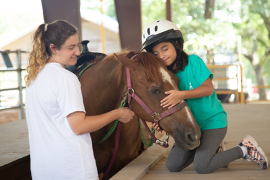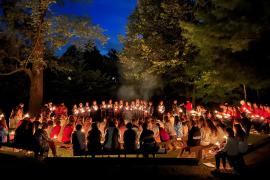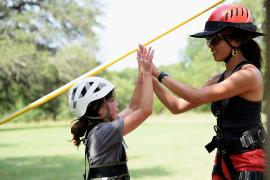Staff recruitment is looking a bit . . . or a lot . . . different this year. Slowly, a shift from loading up the car and driving cross-country to area colleges for job fairs has given way to online recruitment. Yet, one thing has remained consistent; camps actively work to convince a diverse group of young adults, across all academic disciplines, to spend their summer working at camp. Many camps use multiple tactics to recruit staff, including asking university faculty and staff to post or distribute information. Does that material always make it to the students? Sometimes . . .
Over the past two years of engaging academic departments at Western Illinois University for our summer camp job fair, I have learned that direct conversations, internal advocacy, and making it personal goes a long way to reaching the students. During the 2020 job fair, the majority of students attended the fair upon recommendation from a faculty member. So how do we engage those elusive faculty?
Identify a Camp Advocate on the Campus
One comment I received consistently from faculty was their weariness of random emails from “recruiters” asking them to distribute information to their students. Faculty, like everyone, receive endless emails daily and will not always take the time to vet recruiters. Instead, they may just ignore messages, thus not forwarding information to students or, worse, they forward emails without contextualizing it for students. The students typically ignore these emails. In the case of one department on my campus, the department chair will not distribute information to their students from any recruiters. This particular field is in such high demand, there would be an endless stream of recruiters taking up precious time or attention, in their minds.
So…who can advocate on your behalf? Do you have an alumni working at that university? If not, take the time to identify a faculty, staff member, or department chair that may understand the camp industry such as individuals in recreation or parks, education, or student services. Faculty trust other faculty. Your advocate will be the person to open doors for you across campus. This process could be tedious, as you may have to research classes taught in that department. However, a little extra time spent on the front end could pay dividends for making lasting connections on that campus.
Connect with the Academic Department/Program Chair
Last year, I contacted the department chairs for academic programs with students that would easily benefit from working at summer camp (ex: Business Management, Psychology, Art, Education). Despite these individual’s busy schedules, they were open to a personal conversation about the summer camp job fair, especially when I told them it would benefit their students’ job prospects after college. In those meetings, I was prepared with facts and evidence (i.e., Project Real Job) to demonstrate the outcomes. To my surprise, I did not need to spend the time convincing them because they had been to camp.
The current generation of department chairs is the last generation before we inundated youth with endless programmatic opportunities outside of school. Camp was the place they went and many sent their children. They already knew the benefits! They just needed the new outcome language to convince their faculty and students of the worthwhile experience. With this information, they were willing to connect me with specific faculty who would be open to personally promoting camp to their students. Hence, students attending the job fair based on their faculty’s recommendation.
Make It Personal and Applicable
One consistent trait about the current generation in college is the want for unique experiences, but a desire to stay on track with their life goals. Target marketing is important here. Similar to designing multiple messages to reach diverse audiences of campers, the same principles apply here. For instance,
- Business Management: Did you know that camps employ people of various expertise and backgrounds? You’ll have the opportunity to work with a variety of people building your communication, leadership, and problem-solving skills while creating unique experiences for others.
- Psychology: Did you know that camps create opportunities to support the mental, emotional, and social health of their participants? You’ll have the opportunity to help youth build positive relationships with others and adapt to new experiences.
- Speech Pathology: Did you know that camps provide experiences for individuals of all ability levels? You’ll have the opportunity to learn how to work with youth at different stages of development and create unique experiences for them.
Recruiting staff for this summer will be a challenge, no doubt. Colleges can help, but the more camps can translate and personalize staff outcomes to the college gatekeepers, the more likely a good match will occur.
Megan Owens is an assistant professor in the Department of Recreation, Park, and Tourism Administration at Western Illinois University. She has a passion for camps and helping young adults identify their career goals. She also researches how social-emotional learning transpires within camp programs.
This blog was written on behalf of Project Real Job’s efforts to help camps recruit, hire, and retain staff.
The views and opinions expressed by contributors are their own and do not necessarily reflect the views of the American Camp Association or ACA employees.




